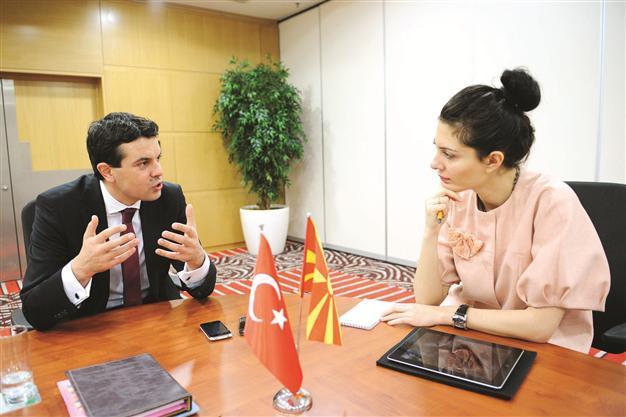Macedonia sets eyes on NATO, EU for stability
ANKARA - Hürriyet Daily News

Macedonian Foreign Minister Nikola Poposki (L) speaks to Hürriyet Daily News reporter Sevil Küçükkoşum in Ankara. Poposki warns about tensions in the Balkans. DAILY NEWS photo, Selahattin SÖNMEZ
The recent killing of five people in Macedonia has triggered ethnic tension, and any ethnic conflict in the country could affect the entire
Balkans, Macedonia’s foreign minister has warned.
Membership for his country in
NATO and the European Union, currently blocked, could be the assurance necessary to diminish tensions, Nikola Poposki, Macedonia’s foreign minister, said, speaking to the Hürriyet Daily News. “The most essential elements these days are to secure our region, so that it can benefit from the peace and prosperity project that is the Euro-Atlantic Integration.”
In April, ethnic strife was stoked in Macedonia when five Macedonian fishermen were killed in Smiljkovci, raising tension between Macedonian Slavs and ethnic Albanians to its highest level since civil war was narrowly avoided in 2001. Hundreds of angry Macedonian Slavs marched in Skopje to protest the killings. The murderers were Islamists, according to the police’s initial findings.
Macedonia will wait and see while the court takes action, but “it’s obvious that it can’t effect in a positive manner relations internally [or] regionally,” Poposki said. “All tensions in Balkans happen in one place and are reflected in the rest of the region. We are very much interlocking countries.”
Unjustified obstaclesPoposki underlined that Macedonia has been facing unjustified obstacles to fulfilling its strategic goals of gaining both NATO and EU membership. “These obstacles can only be a source of frustration. This frustration is certainly reflected in the way things are handled,” he said.
If Macedonia’s goals of becoming a member of NATO and the EU are achieved, “Then any incentives for any sort of radical structures will be decreased and we will see [radicalism] disappear,” Poposki said. “If we keep this legal uncertainty, then obviously anyone who wants to develop some sort of radical agenda will have more space and better possibilities. Now what we need to focus on is a reform agenda, with the perspective of becoming a NATO member state, and that all challenges will be handled within these institutions,” Poposki said.
Despite the police finding that the murderers were Islamists, the minister underlined that “the people who did this should not be identified with any sort of community.”
Greece has blocked Macedonia’s membership in NATO saying that the use of the name “Macedonia” by its neighbor implies territorial aspirations to its own northern province of the same name. Last year, the International Court of Justice (ICJ) ruled that Greece was wrong to block Macedonia’s bid. Poposki is not optimistic about progress.
“This obstacle is not only unjust but also illegal. Since the ICJ ruling qualified that it is not compatible with international law, it doesn’t make sense to keep Macedonia out of NATO. Something should be done. I hope this something will be in more rational direction. As we have seen, Greece has the capacity to do some irrational decision-making in different situations.”
Turkey,
